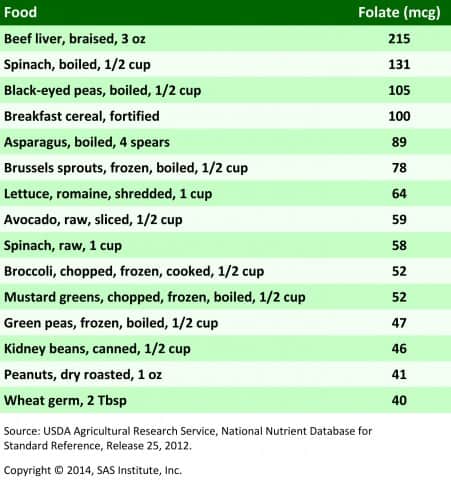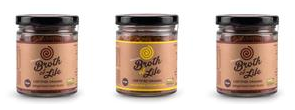
Folate vs. Folic Acid
What you’re about to read about folate benefits and folic acid side effects may surprise you! In fact, it may even surprise some doctors and nutritionists since folate and folic acid are used interchangeably.
The United States Public Health Service and Centers of Disease Control and Prevention recommend that, “All women of childbearing age consume 0.4 mg (400 micrograms) of folic acid daily to prevent two common and serious birth defects: spina bifida and anencephaly.”
This is actually a pretty strong recommendation and you’ll be hard-pressed to find anything like this related to men’s health. In fact, folic acid is one of the very few vitamins and minerals that government health agencies have embraced so emphatically.
I find this shocking because the research out there seems conclusive; folic acid has been proven to be harmful to our health and has even been linked to causing cancer!
Folic Acid Side Effects
Folic acid is a synthetic B vitamin found in supplements and fortified foods. Curiously, mainstream media and government agencies use the term synonymously with folate, the natural form of multiple B vitamins commonly referred to as “vitamin B9.”
This has led the entire nation to believe that folic acid is a naturally occurring vitamin (which it isn’t), and that it’s healthy to supplement with (which it isn’t).
Unlike natural folates (which are directly metabolized by the small intestines), folic acid requires the assistance of a specific enzyme named “dihydrofolate reductase”, which is relatively rare in the body.
Subsequently, when people (particularly women of child bearing age) consume large amounts of folic acid through vitamins and other fortified foods, the body cannot break it down and elevated levels of un-metabolized folic acid ultimately enters the blood stream.
One of the dangers associate with this boost of folic acid in our systems is that it has been linked to cancer.
In her article published in the American Journal of Clinical Nutrition, Cornelia M. Ulrich from the Fred Hutchinson Cancer Research Center in Seattle, sums up the research nicely:
“Although increases in folate before the existence of preneoplastic lesions (such as aberrant crypt foci or polyps in the colon) can prevent tumor development, supplementation with synthetic folic acid may enhance progression once preneoplastic lesions are present.”
The perfect example of this can be seen in, an article published by the Journal of the American Medical Association (JAMA) in 2007.
A randomized controlled trial of nearly 1,000 people conducted over a three year period uncovered that supplementing with folic acid (1 mg/d) literally showed an increased risk of advanced cancer (multiple adenomas). In Ulrich’s words:
“These results suggest that the role of folate in fostering the growth of pre-cancerous cells is a real concern for humans at intakes that can be achieved with a combination of supplement use and fortification with folic acid.”
According to an article published in the Journal of Neurology, Neurology & Psychiatry, folic acid side effects can include:
- Vitamin B12 deficiency
- Epilepsy
- Changes in sex drive
- Lack of focus
- Trouble sleeping
- Emotional ups and downs
High Folate Foods
It is important to keep in mind that folic acid was relatively non-existent in our diet until being first introduced in 1943. After it was shown to help prevent the risk of developing neural tube defects in infants, it became part of the mandatory food fortification list in 1998.
Until then, humans received their vitamin B9 naturally in the foods that they ate.
The highest folate foods include:
- Citrus fruits and juices
- Dark green leafy vegetables
- Liver
- Soaked Beans
- Poultry
- Sprouted ancient grains
Here is an excellent chart listing out some of the best high folate foods… except for number 4 (breakfast cereal), which actually contains folic acid:

Folate Benefits for Your Health
It has been shown that folate helps prevents several birth defects and promotes:
- Adequate birth weight
- Healthy neural tube formation
- Proper development of the face and heart
Consequently, the recommended daily intake for folate during pregnancy is 600 mcg/d, which is roughly 50% higher than the non-pregnant recommendation of 400 mcg/d.
It’s important to note, however, that the pregnancy RDA is based on birth defect prevention, not on promoting health and wellness for a mom.
It is also based on the assumption that 50% of the folate ingested by Momma is absorbed. Yet, studies have shown that this amount varies widely from person to person and other factors need to be taken into account, including zinc status.
In addition to pediatric concerns, adults can also suffer from folate deficiency.
Folate Deficiency Symptoms
Some of the warning signs you may have folate deficiency symptoms include:
- Anemia
- Canker sores
- Diarrhea
- Irritability
- Fatigue/lethargy
- Pale skin
- Premature hair graying
- Stunted growth
- Tender, swollen tongue
It is important to remember, especially for pregnant moms, that folate is extremely easy to get by eating a well-balanced diet.
Make sure to load up the healthy foods I included above and if you’re concerned that you’re not getting enough, you can supplement with an all-natural green superfood powder or whole-food based multi-vitamin.
BUY DEHYDRATED BONE BROTH



